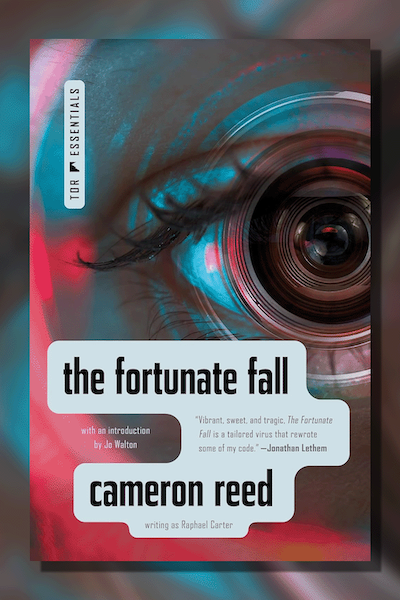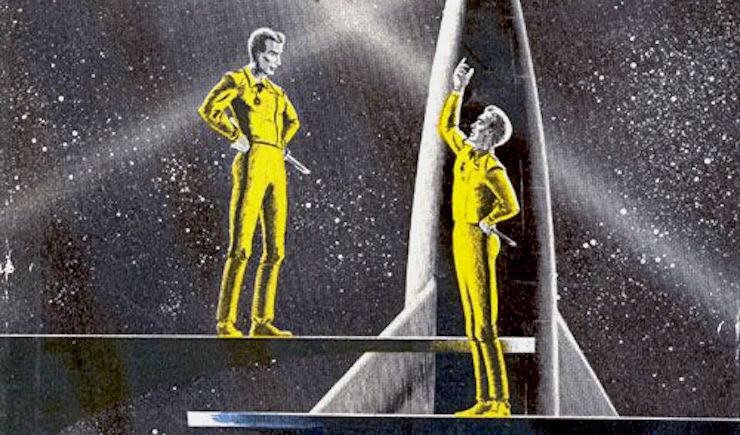There’s a long literary tradition of legendary “only” novels—books with no siblings, authors who only published one novel—and Cameron Reed’s The Fortunate Fall is one of them. It’s been reviewed extensively—here by our own Jo Walton—and remains widely admired.
And it is, in fact, admirable. And rich enough to reward repeated reading and discussion.
Among its other strengths, The Fortunate Fall is a beautifully constructed first-person narrative, told from the point of view of Maya Andreyeva, a “camera.” Which is to say, a person whose entire career is devoted to being a first-person point of view for faceless, amorphous millions. She broadcasts a full-sensation telepresence to the net.
The novel uses this play-with-a-play trick to wonderful effect to comment on the unreliable relation of history and news to truth—and also to facilitate some of the most seamless exposition in the history of the genre. Reed manages to tell us everything we need to know about Maya’s post-apocalyptic, post-fascist dystopia without ever pausing the flow of story, which is a pretty good trick.
It’s through Maya that we learn that the world of The Fortunate Fall has already fallen. She tells her audience—both us, and the fictional ones—about a past holocaust in which millions died.
Maya’s point of view, her narrative, is mediated by both the technology she uses and the presence of a “screener,” whose job it is to make sure the everyday chatter of Maya’s existence doesn’t impinge upon her broadcast. The drawback is a forced one-way intimacy, where the screener knows everything there is to know about the camera, while remaining a cipher. Reed proposes that this commonly leads to screeners falling in love with their cameras, which strained my suspension of disbelief.
Through Maya, we also learn that the story we are reading is a secret history, a revelation about something we’re supposed to already know. Ostensibly, then, the audience for this story is someone other than the audience actually reading the novel—another meta game, another play within the play. And so it goes throughout the book, as Maya tracks down a source with firsthand knowledge of the holocaust she’s researching, only to discover that she herself is being manipulated into uncovering the very knowledge she seeks. The plot develops in nested layers of one story within another, like matroishka dolls— sometimes with more success than on other occasions.
But Maya’s memory is not intact; even she is not a reliable witness.
The worldbuilding alone is worth the price of admission. I wish I had thought of the Unanimous Army, for example—it’s a horrifying and horrifyingly simple concept of posthuman existence, and some of the chills come from contemplating a regime so awful that the obvious solution to it is for much of humanity to forge itself into a hivelike consciousness with only one goal: overthrowing the enemy—no matter what the cost to the consciousness’s individual elements.
What amazes me about this book is that Reed pulls off such a challenging structure so well. There are inevitable bobbles—I found the first half of the book much stronger than the last half, especially once Maya encounters her source and begins finding answers to all sorts of questions she didn’t even know she should be asking. After the elegant exposition of the first few chapters, the backstory dumps later on feel even more awkward by contrast. And in the end, when the matroishka dolls collapse one into another into another, and Maya—inevitably—does something horrible, committing a small crime of her own in response to all the greater crimes that came before—it’s not the wrong choice, but it feels rather that it took a little too long to get there.
Those minor complaints, however, do not keep The Fortunate Fall from being one of the must-read underground classics of science fiction. It’s a lyrical and knowing book, beautifully written, and curiously upbeat—at least, curiously upbeat for a book about human misery and the ways in which we enforce it upon ourselves.
In the end, it is extremely successful at illuminating a number of things about human nature—but the one that remains with me is the acknowledgement that everything we think we know is mediated; and even if we know it from experience, that knowledge is mediated by the narratives we construct.
This article has been updated to reflect Cameron Reed’s preferred name.
A new edition of The Fortunate Fall was published in 2024.














